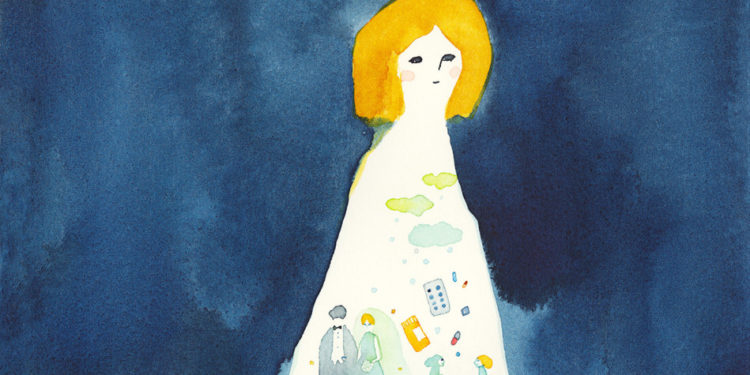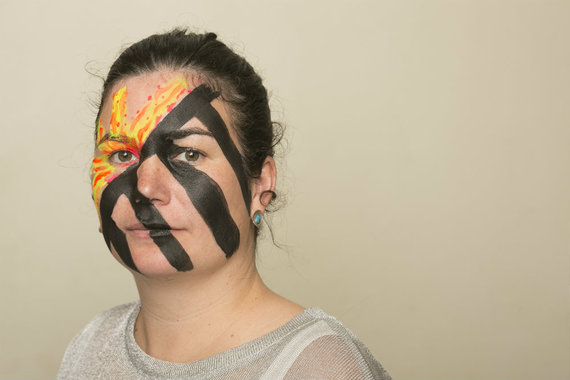My Mother was a Secret: A hidden diagnosis and a lifetime of pain

Posted by Permission: Naureen Ahmed, Original Post MuslimMatter.com
My parents married each other in the late 70’s in Karachi. They moved to Brooklyn, NY, where my mother gave birth to my two sisters in a span of 13 months. My father, a surgeon, was going through residency at the time. It wasn’t easy being a wife of a busy resident, in a new country, with two small babies to look after. She was soon diagnosed with “baby blues”. My father now shares with us scary stories about her violent fits in their small one-bedroom apartment.
A few years later, they moved to a small town in Arkansas, where I was born. My father says they went through 3-year cycles–first year was good, second-year bad, third-year worse, rinse, repeat. This continued for the 9 years of their marriage. So if I do the math, I guess I was born in a bad year. They were legally separated, then reconciled, but ultimately divorced in 1986.
My mom was stuck in 1986 until the day she died.
My father remarried a few years later, and this triggered my mother’s first psychotic “nervous breakdown”. She was in a psychiatric hospital for a few months. I remember visiting her in the hospital, looking at her vacant stares, forced smiles as she showed us the pottery she had created for us. But we couldn’t tell our father. We were warned that we’d never see our mother again if we did.
So it was a secret. If we told anyone, there would be consequences.
My sisters and I carried on through life telling people she had “chemical imbalance and depression.” I never heard the word schizophrenia until I was 25.
She came back home. From the moment my mother would wake up, she’d pace the house–bedroom, living room, kitchen, and back….and forth…until she fell asleep again at night. And she wasn’t quiet while she paced. She ranted and raved about all the wrong everyone had done to her in her life.
And then there were the psychotic fits…brandishing knives, threatening to kill herself. She would violently attack my grandparents and sometimes us. The three of us, scared, would either lock ourselves up in our bedroom, or sit on the top steps, peeking and watching her lash out at anyone and anything in her path.
We were neglected. There was no one to calm us down, tell us it would all be alright: “Sojao, go to sleep, everything will be fine in the morning.”
Some nights she would kick all of us out of the house. We would sneak into the backyard and watch her through the curtains as she wailed and cried and screamed for hours on end.
Life went on, and we just dealt with it, learned how to manage her. My grandparents moved out, they were too old to take her physical assaults. They would pick us up and take us to school in the mornings and drop us home in the evenings with food. But mostly, we were left alone with her.
But we never told our dad. As soon as my eldest sister turned 14, she contacted the court and asked for permission to move in with our father. She tried to take us with her, but we were afraid of “betraying” our mother, so we stayed. And suffered.
Some days, she was happy, blaring Bollywood music on the stereo, singing in her beautiful sing-song voice, with freshly brushed hair and red lipstick. She loved makeup. She loved fashion, wearing beautiful shalwar kameez. At times she would even raid my sisters’ closets. Those were good days. I loved those days. Cherished those days.
But most days were spent pacing, or sitting in bed with wild hair and bloodshot eyes, crying and begging us to tell her everything would be okay. Us, her children….. we were now the parents, and she was the child.
I hated her. “Snap out of it!” “Stop being depressed!’ “Can’t you just be my mother?!?”
She didn’t take care of me. She didn’t cook, didn’t clean, didn’t come to Parent/Teacher conferences, didn’t make my class cupcakes on my birthday, or come to my basketball games. She was a shell. There was no one inside. My sisters taught me about puberty. My sisters cleaned up our room. My sisters packed my lunches until I could do it myself. My sisters and I did our own laundry. I barely learned to read the Quran, and had only memorized 3 surahs by the time I was 17.
We grew up too fast, like animals, just trying to survive.
The school was my outlet. I was popular, loved to laugh and spend time with my friends. But no one could come over. I learned my lesson trying to do that once. Having my friends over meant them asking, “Why is your mom walking back and forth? Why is your mom staring at me?”. I would try to laugh it off as my mom just being an immigrant.
All of us were top of our class, somehow. Through all the madness, we focused on our studies. It was our only way out. Study, go away to college, find a job, get married, get away, whatever it takes.
So we did. We all got married within 9 months of each other. I was the youngest bride at 19 years of age. My sisters stayed in Arkansas, but I moved as far away as possible, to Chicago. I visited my family every year, for a week here and there. I could only handle her in small doses.
I found Islam
I stopped hating her after I found Islam. Especially after my sister read about schizophrenia and confronted our family with her newfound facts. They had no choice but to admit her diagnosis. Then I read everything, and I understood. And I was more compassionate towards her, more patient.
But then she died.
What was the point of her life? All she did was suffer! My grandparents suffered. We suffered. I SUFFERED! But she suffered….. she was so beautiful, innocent, affectionate, artistic…. why God, ya Allah, why?
So we took that pain, and we created SEEMA: Support Embrace Empower Mental health Advocacy. SEEMA was created to support families like ours, who are shamed by the stigma of mental illness, are isolated by their communities, and are suffering alone. Through support groups and workshops, SEEMA will make sure no one suffers alone anymore.
By the way, did I mention my mother’s name was Seema?
To find out more about SEEMA, check us out at seema.muhsen.org or on Facebook @SEEMAdvocacy, or email us at seema@muhsen.org. Join Seema

